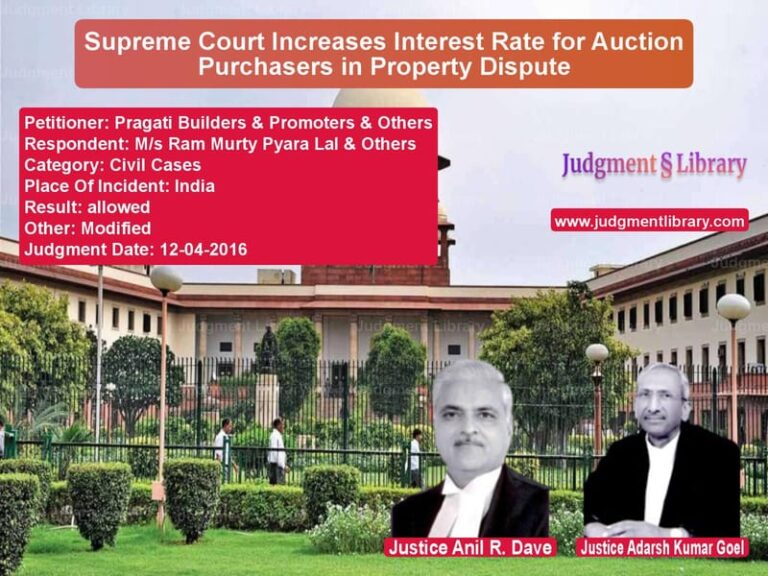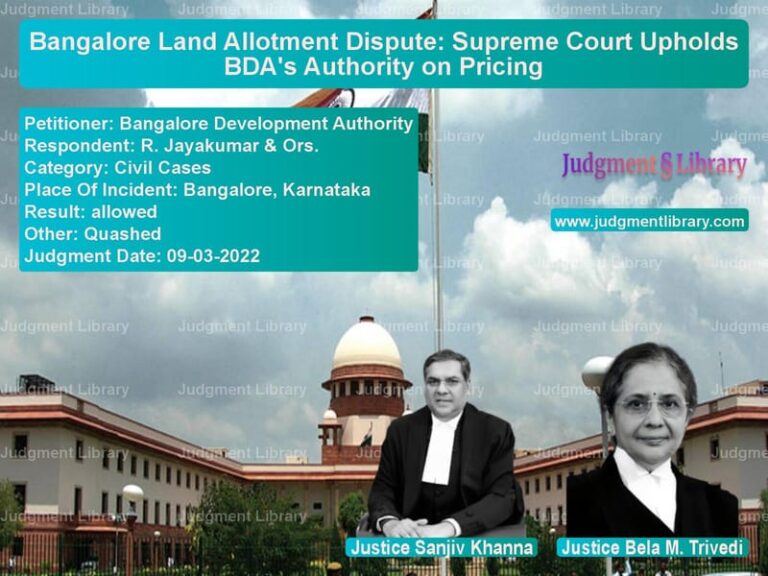Supreme Court Reinstates Removal Order: Rajasthan Civil Services Disciplinary Case
The case of The State of Rajasthan & Ors. v. Bhupendra Singh revolves around the dismissal of a Rajasthan government official, Bhupendra Singh, due to serious misconduct, financial irregularities, and insubordination. The Supreme Court was tasked with determining whether the removal order against him was lawful. In a landmark ruling, the Court overturned the High Court’s decision and reinstated the disciplinary authority’s order of removal.
The appellant, the State of Rajasthan, had removed Bhupendra Singh from service following a departmental inquiry that found him guilty of multiple charges, including unauthorized appointments, financial mismanagement, and obstruction of official duties. However, the High Court ruled in his favor, citing procedural lapses and a lack of adequate reasoning in the removal order. The Supreme Court found these findings erroneous and reinstated the original removal order.
Background of the Case
Facts Leading to the Dispute
- The respondent, Bhupendra Singh, was appointed as an Inspector (Executive) in 1960 and later promoted to Assistant Registrar in 1973 through selection by the Rajasthan Public Service Commission (RPSC).
- In 1976-77, he issued unauthorized approvals for construction projects and made multiple appointments without seeking permission from the Registrar.
- On 06.05.1977, he was reverted to the post of Inspector but refused to comply, obstructing the newly appointed officer from assuming charge.
- Despite being removed from his post, he issued an order on 18.05.1977 appointing himself as the Administrator of Bharat Bus Transport Cooperative Society Ltd.
- During this unauthorized tenure, he sold nine shops at significantly lower than market prices without following the auction procedure.
- He withdrew Rs. 9,025 from the society’s account for purchasing stamps but retained the amount for personal use.
- On 01.08.1977, he ignored a directive from the district Collector to hand over charge of Hanumangarh Society, delaying the process until 19.08.1977.
Legal Proceedings
- In 1979, Bhupendra Singh was suspended pending a departmental inquiry.
- In 1980, a charge sheet was issued under Rule 16 of the Rajasthan Civil Services (Classification, Control and Appeal) Rules, 1958.
- After the inquiry, he was removed from service on 25.09.1985.
- In 1991, the High Court quashed the removal order, citing procedural lapses, and directed a fresh inquiry.
- After re-evaluating the evidence and following due process, the disciplinary authority reissued a removal order on 28.09.1993.
- The respondent challenged this decision, leading to multiple writ petitions.
- In 2008, the High Court ruled in his favor, quashing the removal order again and directing his case for reconsideration.
- The State of Rajasthan appealed to the Supreme Court.
Arguments Presented
Appellant’s Arguments
The State of Rajasthan, represented by its legal counsel, made the following key arguments:
- Bhupendra Singh had engaged in financial mismanagement, insubordination, and unauthorized transactions.
- He repeatedly disobeyed official directives and continued exercising authority after being reverted to a lower post.
- The charges against him were based on official records and were well-documented.
- The High Court’s intervention was unwarranted as the disciplinary proceedings followed due process.
- The removal order was based on substantial evidence and not arbitrary.
Respondent’s Arguments
Bhupendra Singh contended the following:
- The removal order lacked adequate reasoning and failed to consider his representations.
- The disciplinary inquiry was biased and did not adhere to principles of natural justice.
- Several charges were baseless and not supported by concrete evidence.
- Since his suspension order was previously stayed, his case for promotion should have been considered.
Supreme Court’s Observations
Disciplinary Proceedings and Evidence
The Supreme Court examined the case record and concluded:
- The disciplinary proceedings followed the due process of law.
- The charges against the respondent were supported by official records and financial documents.
- The removal order contained sufficient reasoning and was not arbitrary.
- His repeated disobedience and financial irregularities justified the disciplinary action.
Judicial Review in Disciplinary Cases
The Court emphasized that:
- Judicial review in disciplinary cases is limited to examining procedural fairness and adherence to legal provisions.
- Courts should not act as appellate bodies to reassess evidence in disciplinary inquiries.
- Since the disciplinary authority followed due process and arrived at a reasoned decision, the High Court’s interference was unwarranted.
Legal Precedents Considered
The Supreme Court referred to various landmark judgments, including:
- State of Andhra Pradesh v. S. Sree Rama Rao (1963) – Established that courts should not interfere in disciplinary matters unless due process is violated.
- State Bank of India v. Ram Lal Bhaskar (2011) – Reaffirmed that judicial review is limited to checking procedural fairness.
- Boloram Bordoloi v. Lakhimi Gaolia Bank (2021) – Held that disciplinary authorities do not need to provide extensive reasoning if they adopt the findings of the inquiry officer.
Final Judgment
The Supreme Court ruled that:
- The High Court’s judgment quashing the removal order was erroneous and was set aside.
- The removal order dated 28.09.1993 was reinstated.
- The respondent’s service records would reflect termination from the date of removal.
- However, as an extraordinary indulgence, any benefits already received during the interim period would not be recovered from the respondent.
This ruling sets an important precedent for judicial intervention in disciplinary matters. It reinforces the principle that courts should not interfere with reasoned decisions made by disciplinary authorities unless there is a clear violation of due process or principles of natural justice.
Petitioner Name: The State of Rajasthan & Ors..Respondent Name: Bhupendra Singh.Judgment By: Justice Hima Kohli, Justice Ahsanuddin Amanullah.Place Of Incident: Rajasthan.Judgment Date: 07-08-2024.
Don’t miss out on the full details! Download the complete judgment in PDF format below and gain valuable insights instantly!
Download Judgment: the-state-of-rajasth-vs-bhupendra-singh-supreme-court-of-india-judgment-dated-07-08-2024.pdf
Directly Download Judgment: Directly download this Judgment
See all petitions in Disciplinary Proceedings
See all petitions in Public Sector Employees
See all petitions in Termination Cases
See all petitions in Judgment by Hima Kohli
See all petitions in Judgment by Ahsanuddin Amanullah
See all petitions in allowed
See all petitions in Quashed
See all petitions in supreme court of India judgments August 2024
See all petitions in 2024 judgments
See all posts in Service Matters Category
See all allowed petitions in Service Matters Category
See all Dismissed petitions in Service Matters Category
See all partially allowed petitions in Service Matters Category







